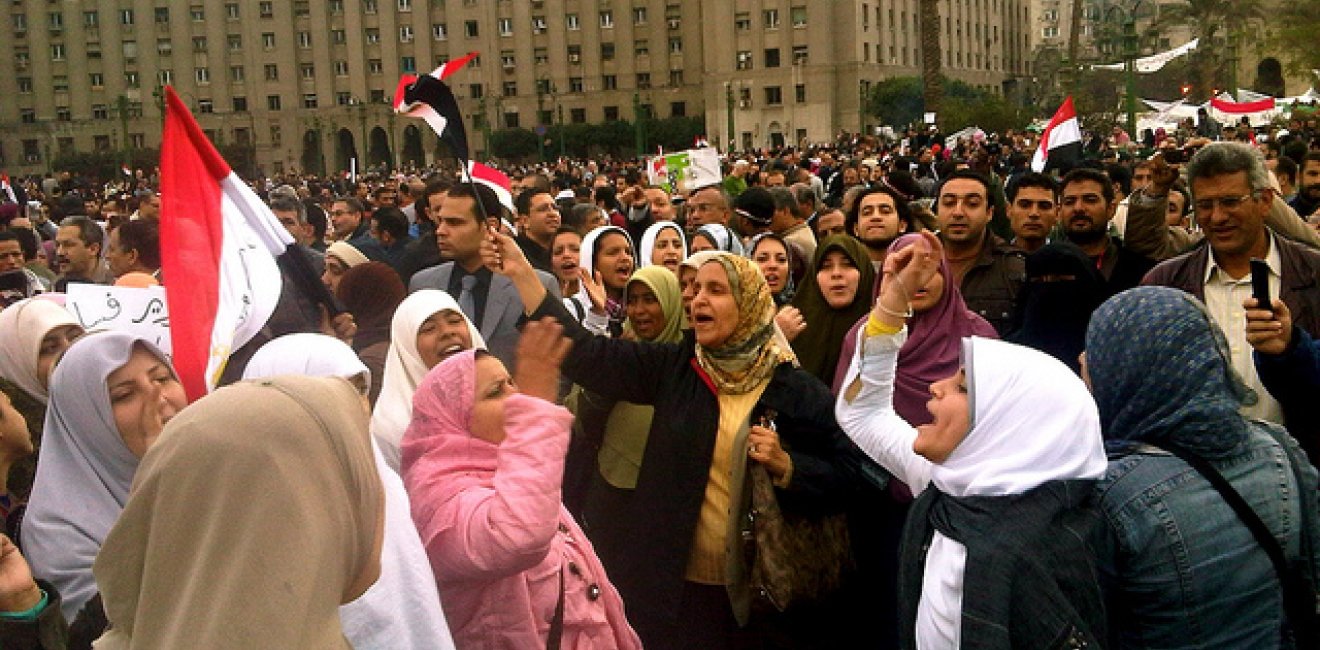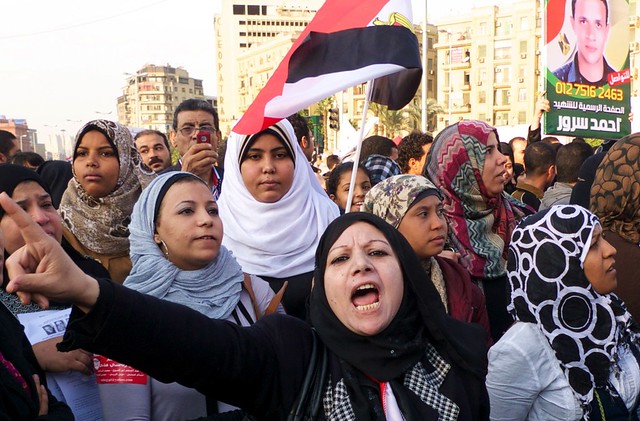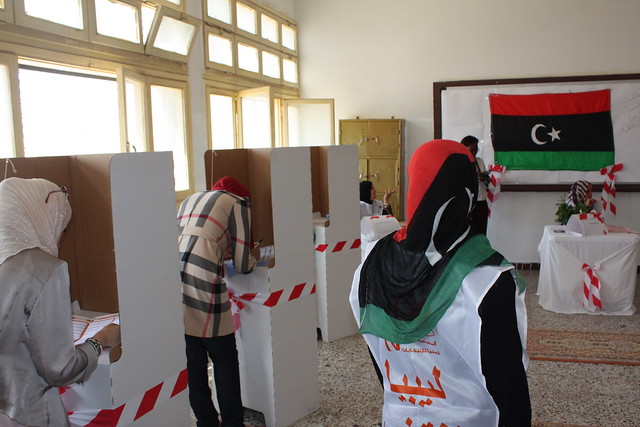Gyrating Women’s Rights
Since the Arab uprising in 2011, female activists in the Middle East have launched campaigns for legal changes to formally enshrine their rights—but with limited impact.
Since the Arab uprising in 2011, female activists in the Middle East have launched campaigns for legal changes to formally enshrine their rights—but with limited impact.

By Haifa AlSudairy
Since the Arab uprising in 2011, female activists in the Middle East have launched campaigns for legal changes to formally enshrine their rights—but with limited impact. Three countries—Egypt, Tunisia and Libya—have produced disparate constitutions. The role of Islamist parties varied widely too.
In Egypt, the Salafi Nour Party participated in the drafting of the constitution and tried to limit women’s rights. In Tunisia, female members of the Islamist Ennahda Party cooperated with their more secular counterparts to protect women’s rights. And in Libya, extremist Islamists boycotted the constitution drafting process altogether.
The three countries have passed more constitutional amendments in the past four years than they have in the past 40 years. The changes could help protect against a significant rollback of women’s rights. The following is an overview of women’s rights in the Egyptian, Tunisian and Libyan constitutions and the positions of local Islamist groups.
 Women’s rights provisions have gyrated radically. In 1979, Egyptian women were granted a quota of 30 seats in parliament, or just over eight percent of the total members. The quota was abolished in the mid-1980s. In 2010, it was restored and increased to more than 60 seats, or about 12 percent of the new total number of seats. After President Hosni Mubarak’s ouster in 2011, a constituent assembly – dominated by the Muslim Brotherhood—wrote a new constitution. It was adopted by a public referendum in 2012. The women’s quota was removed. The number of women in parliament plummeted—from a high of 68 under Mubarak to 10 under President Mohamed Morsi. The new constitution was abandoned after Morsi was toppled by the military in 2013.
Women’s rights provisions have gyrated radically. In 1979, Egyptian women were granted a quota of 30 seats in parliament, or just over eight percent of the total members. The quota was abolished in the mid-1980s. In 2010, it was restored and increased to more than 60 seats, or about 12 percent of the new total number of seats. After President Hosni Mubarak’s ouster in 2011, a constituent assembly – dominated by the Muslim Brotherhood—wrote a new constitution. It was adopted by a public referendum in 2012. The women’s quota was removed. The number of women in parliament plummeted—from a high of 68 under Mubarak to 10 under President Mohamed Morsi. The new constitution was abandoned after Morsi was toppled by the military in 2013.
A new constituent assembly included representatives from al Azhar, Egypt’s top institution of Islamic scholarship, and the Salafi Nour Party were part of the drafting committee. The 2014 constitution calls for women to have one quarter of all seats in local councils, but no quota in the national parliament. The Nour Party also demanded including a mention of Sharia to limit women’s rights, although the final version did not contain such a reference.
The constitution “fell short of its true aspirations” on women’s rights because of the need to win the support of the Nour Party members, according to Magda Shahin, director of the Prince Alwaleed Centre for American Studies and Research at the American University in Cairo. But the constitution advances women’s rights, mainly through Article 11. Article 180 sets quotas for women, Christians and youth in local government entities. Women are guaranteed 25 percent of seats in these councils.
Article 214 also mandates a council for women, independent of the government, to report human rights violations to public authorities.
Article 11: The place of women, motherhood and childhood
The state commits to achieving equality between women and men in all civil, political, economic, social, and cultural rights in accordance with the provisions of this Constitution.
The state commits to taking the necessary measures to ensure appropriate representation of women in the houses of parliament, in the manner specified by law. It grants women the right to hold public posts and high management posts in the state, and to appointment in judicial bodies and entities without discrimination.
The state commits to the protection of women against all forms of violence, and ensures women empowerment to reconcile the duties of a woman toward her family and her work requirements.
The state ensures care and protection and care for motherhood and childhood, and for breadwinning, and elderly women, and women most in need.
Article 180 Local Councils
“Every local unit elects a local council by direct, secret ballot for a term of four years. A candidate must be no younger than 21 years old. The law regulates other conditions for candidacy and procedures of election, provided that one quarter of the seats are allocated to youth under 35 years old, one quarter is allocated for women, workers and farmers are represented by no less than 50 percent of the total number of seats, and these percentages include a proper representation of Christians and people with disability.”
Article 214: National Councils
The law specifies independent national councils including the National Council for Human Rights, the National Council for Women, the National Council for Childhood and Motherhood, and the National Council for Persons with Disability. The law sets out their structures, mandates, and guarantees for the independence and neutrality of their members. They have the right to report to the public authorities any violations pertaining to their fields of work.
Tunisia has long prided itself among Arab countries for its progressive laws on women’s rights. In 1956, President Habib Bourguiba abolished polygamy, declared early and forced marriage illegal, passed a minimum age for marriage and declared that both sexes should have equal opportunities. The laws, enshrined in Tunisia’s Personal Status Code, were a first in the Arab world.
 The December 2010 uprising and subsequent ouster of President Zine al Abidine Ben Ali opened up the political sphere. The rise of the moderate Islamist party Ennahda initially raised questions about the potential implementation or incorporation of Sharia in national laws. Ennahda won 41.5 percent of the vote in the first parliamentary elections in October 2011 and formed a ruling coalition with two secular parties. But Ennahda’s female members of parliament worked in cooperation with their colleagues in the secular Ettakattol party to ensure gender equality in the new constitution, passed in 2014.
The December 2010 uprising and subsequent ouster of President Zine al Abidine Ben Ali opened up the political sphere. The rise of the moderate Islamist party Ennahda initially raised questions about the potential implementation or incorporation of Sharia in national laws. Ennahda won 41.5 percent of the vote in the first parliamentary elections in October 2011 and formed a ruling coalition with two secular parties. But Ennahda’s female members of parliament worked in cooperation with their colleagues in the secular Ettakattol party to ensure gender equality in the new constitution, passed in 2014.
Articles 34 and 46 guarantee equality between men and women in all elected assemblies. Article 46 addresses the issue of gender-based violence. But it only amounts to a legal framework. Ahlem Belhai, former president of the Tunisian Association of Women Democrats, issued a statement on the limitations of article 46, calling for additional language that would ban discrimination based on sex and/or skin color.
Article 21
“All citizens, male and female, have equal rights and duties, and are equal before the law without any discrimination.
The state guarantees freedoms and individual and collective rights to all citizens, and assures all citizens the conditions for a dignified life.”
Article 34
“The rights to election, voting, and candidacy are guaranteed, in accordance with the law.
The state seeks to guarantee women’s representation in elected bodies.”
Article 40
“Work is a right for every citizen, male and female. The state shall take the necessary measures to guarantee work on the basis of competence and fairness.
All citizens, male and female, shall have the right to decent working conditions and to a fair wage.”
Article 46
“The state commits to protect women’s accrued rights and work to strengthen and develop those rights.
The state guarantees the equality of opportunities between women and men to have access to all levels of responsibility in all domains.
The state works to attain parity between women and men in elected Assemblies.
The state takes all necessary measures in order to eradicate violence against women.”
Article 74
“Every male and female voter who holds Tunisian nationality since birth, whose religion is Islam shall have the right to stand for election to the position of President of the Republic.
On the day of filing the application for candidacy, the candidate must be a minimum of 35 years old.”
 Under Moammar Qaddafi, women had no designated political rights. The few women who held public positions were likely picked for their loyalty and connections to Qaddafi. His Green Book noted, “In view of his different nature and in line with the laws of nature, the male has played the role of the strong and striving not by design, but simply because he is created that way. The female has played the role of the beautiful and the gentle involuntarily because she was created so.” After Qaddafi’s ouster in 2011, a Libyan assembly drafted a preliminary constitution in December 2014. Extremist Islamists boycotted the committee and disrupted the vote for members in one city.
Under Moammar Qaddafi, women had no designated political rights. The few women who held public positions were likely picked for their loyalty and connections to Qaddafi. His Green Book noted, “In view of his different nature and in line with the laws of nature, the male has played the role of the strong and striving not by design, but simply because he is created that way. The female has played the role of the beautiful and the gentle involuntarily because she was created so.” After Qaddafi’s ouster in 2011, a Libyan assembly drafted a preliminary constitution in December 2014. Extremist Islamists boycotted the committee and disrupted the vote for members in one city.
The preliminary draft pushed for legal equality between male and female citizens but guaranteed limited women’s rights. As of late summer 2015, no draft had been finalized, due in large part to political turmoil.
The Right to Equality between Male and Female Citizens
The State shall ensure equality between male and female citizens within and before the law. To this end, it shall take the following measures:
1. Prohibit discrimination whether by depravation, reduction, increase or restriction.
2. Prohibit assumption of public functions by those convicted of a crime of discrimination.
3. Empower disabled persons in order to enjoy their rights and develop their capacities.
Prohibition of Discrimination Against Women
All forms of discrimination against women shall be prohibited, including:
1. Arbitrary dismissal for reasons related to maternity; [they shall have] the right to a paid leave and maternity leave.
2. Forced marriage.
3. All forms of violence against women; necessary actions shall be taken to prevent thereof.
The State shall ensure:
4. Equal opportunities among men and women in responsibilities in all sectors.
5. Right to equal consequences of being Libyan for women on the same basis as men. The State shall also commit to the acquired rights of women and shall work to support and develop thereof.
Haifa AlSudairy was a research assistant at the Woodrow Wilson International Center for Scholars from 2014-2015.

Learn more about Hamas and how it relates to similarly aligned organizations throughout the region. Read more


